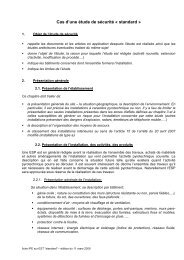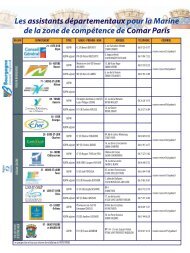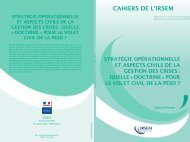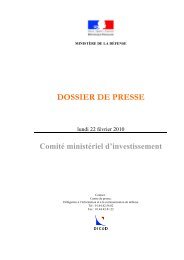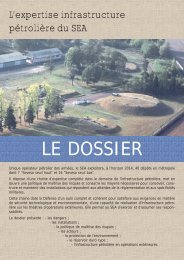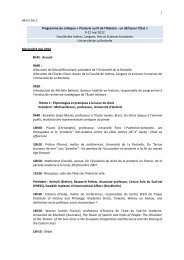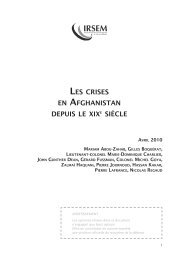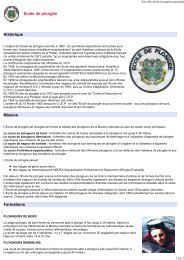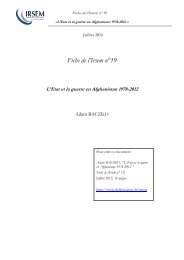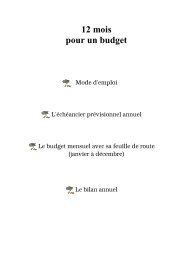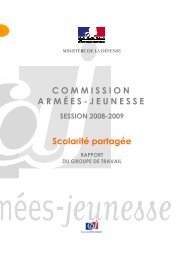Rapport Védrine_ENG_GERMAN - Ministère de la Défense
Rapport Védrine_ENG_GERMAN - Ministère de la Défense
Rapport Védrine_ENG_GERMAN - Ministère de la Défense
Erfolgreiche ePaper selbst erstellen
Machen Sie aus Ihren PDF Publikationen ein blätterbares Flipbook mit unserer einzigartigen Google optimierten e-Paper Software.
of "off-the-shelf" products seeking to pay the lowest price and not as producers or manufacturers, since<br />
they do not have or no longer have a <strong>de</strong>fence industry.<br />
In addition to Smart Defence, we also need to be careful about the on-going discussion regarding<br />
greater use of the common-fun<strong>de</strong>d budget in these times of economic crisis to finance such things as<br />
certain missile <strong>de</strong>fence, intelligence and cyber <strong>de</strong>fence capabilities. Extending the scope of the<br />
common-fun<strong>de</strong>d budget would shift more of the bur<strong>de</strong>n onto the <strong>la</strong>rgest contributors in the Alliance. The<br />
five <strong>la</strong>rgest contributors already provi<strong>de</strong> 68% of the common funding and the fourteen smallest<br />
contributors provi<strong>de</strong> 5.6%. For some Allies, such as France, this would mean they pay twice for<br />
capabilities that they have already <strong>de</strong>veloped at the national level. It would also infringe on the solidarity<br />
principle at the heart of the Alliance, which relies above all on the political <strong>de</strong>termination of the members<br />
to assume their responsibilities, by maintaining their national and multinational capabilities. On the other<br />
hand, a discussion on making better use of the common fun<strong>de</strong>d budget, rather than expanding it, would<br />
be warranted.<br />
Therefore, a French, and European, industrial strategy is nee<strong>de</strong>d within NATO<br />
For all of these reasons, it is urgent to have a French and European industrial strategy within NATO and<br />
vis-à-vis NATO (and within the European Union, see below), with early i<strong>de</strong>ntification of potential<br />
contracts in such areas as missile <strong>de</strong>fence (as long as it is limited and acceptable) and Smart Defence,<br />
based on a clear division of programmes beforehand between NATO and the European Defence<br />
Agency. This makes it important to strengthen the informal, but essential, consultation arrangement<br />
between the Supreme Allied Comman<strong>de</strong>r Transformation, SACT, and the Chief Executive of the EDA to<br />
eliminate conflicts between NATO and EDA programmes. The Directorate General of Armaments p<strong>la</strong>ys<br />
a critical role and must be the military branch of this policy within the framework of the gui<strong>de</strong>lines set by<br />
the Defence Staff and the Delegation for Strategic Affairs.<br />
“Europeanising” the Alliance<br />
The gradual shift in the positions of the United States and Presi<strong>de</strong>nt Obama should make the Americans<br />
open to this process and we have seen signs of potential willingness in Washington. The new team for<br />
Presi<strong>de</strong>nt Obama’s second administration may un<strong>de</strong>rstand that no further effort on military capabilities<br />
will be forthcoming from Europeans unless the spirit of <strong>de</strong>fence is revived and that this spirit will not be<br />
revived unless the United States invites Europeans to take on more responsibilities. In a way, the<br />
Alliance is the victim of its own success in Europe. It has <strong>de</strong>terred aggression and protected Europe so<br />
well that her spirit of <strong>de</strong>fence has been dulled. In the face of global turmoil, the long-term interest of the<br />
United States is to have Europe be a genuine, capable and reliable partner, however difficult it can be to<br />
work with at times. The ritual call for “bur<strong>de</strong>n sharing” is not enough and has actually been ineffective.<br />
Despite everything, without preparation, raising high the banner of the "European pil<strong>la</strong>r", according to<br />
the beautiful expression used by John F. Kennedy, which did not go anywhere, or calling for a<br />
"European i<strong>de</strong>ntity”, or a European “caucus” within the Alliance, might not be ambitious enough and<br />
could potentially be inf<strong>la</strong>mmatory. Even in 2012, by doing so France could once again raise the hackles<br />
of the NATO technostructure, the State Department and the Pentagon, which are more open to change<br />
than they were in the past nonetheless, and of our European Allies, who are already worried about the<br />
"pivot" towards Asia. We may think that this is paradoxical and shortsighted, but that is the way it is. Our<br />
European Allies do not want to give the Americans any excuses for further disengagement! Within<br />
European organisations, calls for a mission p<strong>la</strong>nning and execution staff do receive some genuine<br />
support, but they also revive fears about principles and a British veto. On the other hand, in day-to-day<br />
practice, there are many opportunities within NATO, particu<strong>la</strong>rly for the European ministers involved, to<br />
strengthen concerted action and thinking by Europeans in advance of NATO <strong>de</strong>cisions on issues<br />
re<strong>la</strong>ting to discussions held within the European Union.<br />
21



